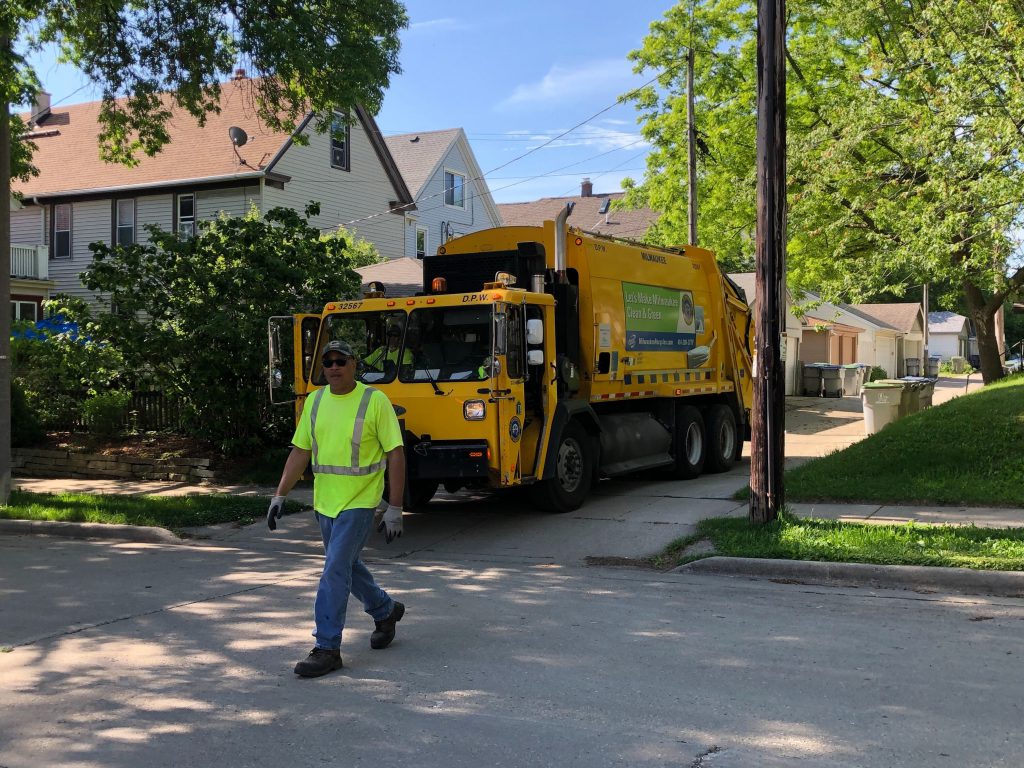Can Recycling Improve Racial Equity?
Aldermen want recycling contract with a city-based business to create jobs for residents.
Milwaukee residents recycled over two million pounds of electronics last year. The equipment was shipped to a state-certified recycler in Rock County. In 2021, the Department of Public Works will switch contracters and send electronics to Dynamic Lifecycle Innovations in Onalaska in western Wisconsin.
At least three members of the Common Council want those old electronics to stay in the city of Milwaukee.
“This is a golden opportunity,” said Alderman Robert Bauman at last Wednesday’s meeting of the Public Works Committee. “I have seen what these companies do and how they operate.” He said the work is often labor intensive and involves breaking down electronics, often with blunt objects, to separate materials.
“All I hear is about diversity and disparities and the very justified observation of institutional racism and task forces, and right over here we are handing out money,” said Bauman.
DPW will spend “a few hundred thousand” on the contract according to resource recovery program manager Samantha Longshore. “Typically we are paying per unit,” she said.
“That’s real money that could go to a local business,” said Bauman. “Seems pretty basic to me. Shut down all these committees and just spend the money we are already spending.”
Ald. Russell W. Stamper, II supported Bauman’s push. The two noted that a Milwaukee contractor could draw in work from other Wisconsin communities.
Ald. Mark Borkowski went as far as to identify a potential workforce — those that hold salvage licenses from the city. “What they’re doing on a micro basis it would be great if we could have them do it on a macro basis,” he said. “They’re covering all of our roads on a daily basis looking for things they can salvage.”
Longshore said the contract goes to an E-Cycle Wisconsin certified recycler. She said the contract is awarded on an annual basis with renewal options. The certified recyclers work with manufacturers to meet their mandated recycling targets.
Bauman and Stamper called for DPW to use a full request-for-proposal process next time the contract is up for bid. An RFP would allow the city to award preference points to local firms, a move that could tip the scales towards a city business.
The weight of electronics recycled by the city has been falling in recent years, but DPW believes there is a logical answer why. “Generally that weight is going down as we are getting out of some of the heavier [televisions],” said Longshore.
When including other recyclables, the average Milwaukee home recycled 261 pounds of material in 2019, down from 281 pounds in 2018.
Other Recycling Odds and Ends
Longshore’s report to the committee didn’t deal only with electronics. A few other items of note:
- Milwaukee collected approximately four percent less (1,108 tons) in recycling in 2019 than in 2018, a drop which Longshore attributed to a winter that had city garbage trucks missing or delaying pickups in favor of snow plowing.
- The amount of corrugated cardboard set a record in 2018 (4,405 tons), but fell by 1,206 tons (27.4%) in 2019. Those Amazon boxes belong in the blue bin.
- The city’s landfill diversion rate increased by 1.8 percent. The report attributes much of this to fall leaf collection.
- The city remains on track to move to biweekly recycling pickup citywide. “We are really hoping that residential recycling rate goes up,” she said.
- The number of plastic bags being placed into recycling bins is falling. The bags are not recyclable and jam machinery. “Anecdotally, that has gotten better,” said Longshore.
- Longshore said unlike other cities, Milwaukee continues to recycle the eligible items it collects. Equipment at the recycling facility uses a light to determine what type of plastic an item is and sorts it appropriately. Other cities accept more types of plastic, like #7 plastics, but a recent NPR report revealed that most of those items are ultimately thrown away. “It’s really important that if it’s on the list, we are recycling it,” she said. A guide can be found on the city website.
- Bauman still wants the city to implement a bounty for tires and mattresses.
- Borkowski expressed frustration that more Milwaukeeans aren’t recycling. “My goodness gracious, at a certain stage, when does it click?” he asked, noting that he’s been tempted to take aluminum cans out of the garbage when he sees them.
Legislation Link - Urban Milwaukee members see direct links to legislation mentioned in this article. Join today
If you think stories like this are important, become a member of Urban Milwaukee and help support real, independent journalism. Plus you get some cool added benefits.
Related Legislation: File 200693





















